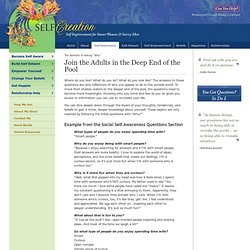

Basics 1. 30 Things to Stop Doing to Yourself. 10 Ways To Be Happy, On Purpose. “He who depends on himself will attain the greatest happiness” ~Chinese Proverb I was at a Women’s Leadership Conference about a year ago and had an “ah-ha moment”. We were all introducing ourselves and asked to share a few things to help with the process. One question left me baffled and ultimately changed my life; “What do you do to make yourself happy?”. At the time I honestly didn’t know. I had a great job, friends, and family. It’s not been an easy road, but it’s been the most fulfilling adventure I’ve ever been on and I feel that I should now share what I’ve learned with others. 1.
“Today you are you, that is truer than true. How many times have we heard “no one will love you until you learn to love yourself” or “nobody knows you the way you do”? So get to know the right-now-real you, both the good and the bad, and own it. The good news is that if you don’t like certain aspects of yourself right now, you have it in your control to change that. 2. “Open your eyes and look within. 3. The Importance of Mind-Wandering. It’s easy to underestimate boredom.

The mental condition, after all, is defined by its lack of stimulation; it’s the mind at its most apathetic. This is why the poet Joseph Brodsky described boredom as a “psychological Sahara,” a cognitive desert “that starts right in your bedroom and spurns the horizon.” The hands of the clock seem to stop; the stream of consciousness slows to a drip. We want to be anywhere but here. However, as Brodsky also noted, boredom and its synonyms can also become a crucial tool of creativity. Brodsky was right. In recent years, however, neuroscience has dramatically revised our views of mind-wandering. What’s happening inside the brain when the mind wanders? Activation in medial prefrontal default network regions was observed both in association with subjective self-reports of mind wandering and an independent behavioral measure (performance errors on the concurrent task).
Two things worth noting here. The point is that it’s not enough to simply daydream. Questions To Help You Be More Self Aware. Where do you live?

What do you do? What do you look like? The answers to these questions are only reflections of who you appear to be to the outside world. To move from shallow waters to the deeper end of the pool, the questions need to become more meaningful. Knowing why you think and feel as you do gives you access to information you can use to re-create your life. You can dive deeper down through the layers of your thoughts, tendencies, and beliefs to gain a richer, deeper knowledge about yourself. Example from the Social Self Awareness Questions Section What types of people do you enjoy spending time with?
The further you go, the more insight you gain. Continue reading...